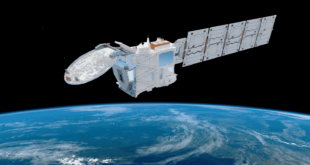By Andrea D’Ottavio

This year Italy is hosting two of the most important events for the Space domain, alongside chairing the G7. But what could be the perfect opportunity to consolidate Italy’s position in the Space sector falls short in the hands of a political class without a clear strategic vision, confining Italy to be characterized by a historical lack of planning capacity and low technical ambitions, in contrast with the several industrial and academic excellences that it expresses at worldwide level in the aerospace sector.
In 2024, Italy will be the focus of two of the most important events in the aerospace field. Next September, in Florence, there will be the 34th Congress of the International Council of Aeronautical Sciences (ICAS), while in October, Milan will host the world’s most important astronautical event: the International Astronautical Congress (IAC-2024). This year at its 75th edition, IAC-24 has already been named the “records edition” for the highest number of abstracts ever received from all over the world. Italy is the only other nation, together with Australia in 1998, to host both events in the same year.
In theory, this would be a unique opportunity for Rome’s geopolitical ambitions, the perfect occasion to elevate Italy to the “serious Space players” category. Nevertheless, Italy continues to express a historical absence of a properly structured national space strategy. By virtue of Italy’s success in being able to bring both of these events within its borders, it is urgent to define what goals (if any) Rome intends to pursue in the increasingly congested and competitive (including military) space domain.
A fate that continually gets out of hand
Italian newspapers do not seem particularly interested in engaging in smart media campaigns to raise awareness around the impact that aerospace technologies can have on our society. Because of that, explaining that such technologies must be developed within a framework of autonomy and technological top-level quality (synonymous with competitiveness and scientific credibility) almost feels like an impossible task. Sadly, in Italy this is a trend observable around several technological issues of absolute importance for the maintenance of the country’s wealth, as well as its security and quality of life. An excellent example is nuclear power for civil applications. Nuclear technologies will be increasingly intertwined with space activities (they already are for military purposes, as the recent Vladimir Putin’s intervention regarding the deployment of nuclear assets in low earth orbit (LEO) sadly reminded us).
The goal of Space is not confined to ensuring adequate scientific, technological, and industrial progress, but it is to allow a nation to achieve a prestigious and recognized positioning in the world arena.
This concept is far from innovative. In the early 60s nuclear tests were indeed conducted in LEO, both by the United States (Starfish Prime within Operation Fishbowl, July 1962) and by the Soviet Union (Project-K, run between 1961 and 1962). At the time Italy excelled within this field. It is quite embarrassing that the country that installed the first nuclear fission reactor (by the great Enrico Fermi) is now a country that, because of a series of ill-fated choices not appropriately balanced by a competent ruling class, has very little international positioning (not only from a scientific-technological point of view, but also from a political point of view), and is dependent for its energy production on external providers. Such foreign forces may not necessarily be interested in Italy’s best, especially if it may come to undermine their interests, which is natural and reasonable. Pure raison d’état.
Lack of vision
Given the increasingly dominant role of aerospace technologies, their development has become the main prerogative of several governments through which to legitimize their role and exercise their power in the field of foreign affairs. A concrete example of this is the ability of a nation to have intercontinental ballistic missiles (ICBM). It’s a weapon resulting from the research and development of high-level aerospace technologies, which in turn, combined with an autonomous capacity to develop and produce GPS and telecommunication satellites, make such systems fundamental in shaping international power relationships. This is why aerospace technologies are defined as strategic, on par with few others. The stakes are very high, and always have been since the days of Gaetano Arturo Crocco and Luigi Broglio.
The two Italian aeronautical engineers and militaries were the first (and still today maybe the only ones) in the country, to understand that the goal of Space is not confined to ensuring adequate scientific, technological, and industrial progress, but it is to allow a nation to achieve a prestigious and recognized positioning in the world arena. A positioning that, without Space, is very difficult to achieve and maintain. The European context is the perfect example of such exclusivity. Nowadays, Space in Europe is handled by Paris and Berlin, certainly not Rome, despite the capabilities Italy can provide from a technological and industrial point of view. From a political and industrial perspective, the closest parallel to the trajectory currently followed by the Italian Space sector is the one of the car industries. That one, too, is under French control, the real (European) “internal constraint” of Rome. A bitter reality that is, however, not Paris’ fault. It is Rome that is not able to express a clear, well-defined space national strategy. This is because the ruling class historically has not been up to the task of identifying and reflecting the national interests within the complex global contest.
The lack of technological awareness of the Italian ruling class is somehow appalling, and potentially dangerous.
A shortcoming that, these days, leaves the Italian industry to face alone, without any kind of governmental direction, the increasingly competitive and contested space domain. The definition of a national strategy is the sign of a clear “idea of itself in the world”. The first and most important strategic choice of a country is defining such “idea of itself”, aka understanding its geopolitical identity, and clearly stating “who it wants to be and what it wants to become in the world.” As of today, even though Italy is among the world’s leaders in the development of satellite technologies in the field of Earth Observation (EO) (through its national satellite constellation “Cosmo SkyMed” (one of the most advanced in the world), to be soon consolidated and extended with the new satellite constellation “IRIDE”), its role is not recognized neither by Berlin nor Paris. One of the few recent signs of hope for more equilibrated power distribution at the European level was the appointment of the Italian Simonetta Cheli to the presidency of ESRIN, the European Centre of Earth observation activities, located right in Italy, in Frascati.
Italy continues to express a historical absence of a properly structured national space strategy.
Despite its geopolitical challenges, Italian technical abilities keep maintaining high standards. Indeed, in addition to its worldwide role in the field of EO, Italy leads also the world in the construction of habitation space modules. Almost 50 percent of the habitable volume of the “International Space Station” (ISS) was built in Turin where also its cargo spacecraft “Cygnus” was first produced and assembled. Again, the future cis-lunar space station, the “Gateway”, will be also mostly built in Turin: the main US module “HALO” commissioned by Northrop Grumman, and the modules named “Lunar I-HAB” and “Lunar view” as part of the European (ESA) contribution to the Gateway space program. What can be defined as the farthest space outpost ever built will be largely manufactured in Italy, as was the first one, the ISS. No European nation can boast anything remotely similar. However, returning yet to the concept of “legitimacy,” none of these worldwide successes bought Italy first row tickets in the European Space domain. Indicative is the fact for example that Italy was not been able to obtain flying slots for its astronauts to the Moon. The head-to-head battle (again) with Paris, or to better say, “from Paris”, reached its climax in December 2022. In that period President Macron flew to Washington to meet US Vice President Kamala Harris, to (literally) exchange France’s adherence to the Artemis Accords with the appointment -by the US- of French astronaut Tomas Pesquet (today officially on the ESA’s official crew list) as the first European astronaut “on the Moon” (more precisely “around” the Moon, on the Gateway). A strategy that did not pay off, since in the end the first non-American astronaut on the Moon will be Japanese.
The Astronauts Conundrum
Italy is one of four nations, the others being the United States, Russia, and Japan, to have had two Commanders leading the ISS (Luca Parmitano and Samantha Cristoforetti), testifying again the excellent human skills of the Mediterranean country. Nevertheless, last year, for the first time in more than a decade, Italy was left without operational ESA astronauts. Even worse, in 2020 the country failed to secure the appointment of ESA Director General, a role that, over the past eighteen years, has been filled by both France and Germany, respectively with Jean-Jacques Dordain for twelve consecutive years (from 2003 to July 2015), and Johann-Dietrich Worner for six years (from July 2015 to February 2021). Since then, the agency has been led by the Austrian Josef Aschbacher. The last Italian to lead ESA was Antonio Rodotà back in 1997, more than twenty-seven years ago. Another negative result generated by an equally negative national strategy.
Space in Europe is handled by Paris and Berlin, certainly not Rome, despite the capabilities Italy can provide from a technological and industrial point of view.
Continuous failures that should (and they should!), if not worry, at least constitute a wake-up call for Italy, the third largest contributor to ESA’s budget and one of ESA’s founding members. These continuous failures are a testament to the insufficient attention paid by the Italian Government(s) to the aerospace sector. The lack of technological awareness of the Italian ruling class is somehow appalling, and potentially dangerous. Alongside not formulating a solid national law on the regulation of space activities on its own national territory (in misalignment with the International treaties), Rome only endowed itself with the Italian Space Agency (ASI) in 1988: twenty-seven years after the birth of the respective French space agency (CNES) in 1961.
This path must be reversed by first and foremost identifying a clear national strategy (with a rebalancing of the “Trattato del Quirinale” that really does little, if anything, for the national space interests) that will lead the way for the national industrial sector. The alternative is to remain “not masters of one’s own destiny”, alas to undergo a redirection of the Italian space industrial sector by third-party entities, and a downsizing, analogous to what is happening with the automotive sector (which is currently being dismantled). Too bad that the stakes are much higher now. Italy is a story of an unfulfilled destiny, a destiny that continuously escapes its reach.
This article was originally published in Italian on Geopolitica.Info. You can read the original piece here.
The information contained in this article represents the personal views and opinions of the author, and do not necessarily represent the views or opinions of Thales Alenia Space nor of SpaceWatch.Global.

Andrea D’Ottavio is the coordinator of the Space section of Geopolitica.Info and a Space Operations and Mission engineer. Andrea owns a Master’s degree in Aeronautical and Astronautical Engineering from the Polytechnic University of Turin with a specialization in aerospace systems, particularly in the military field.





